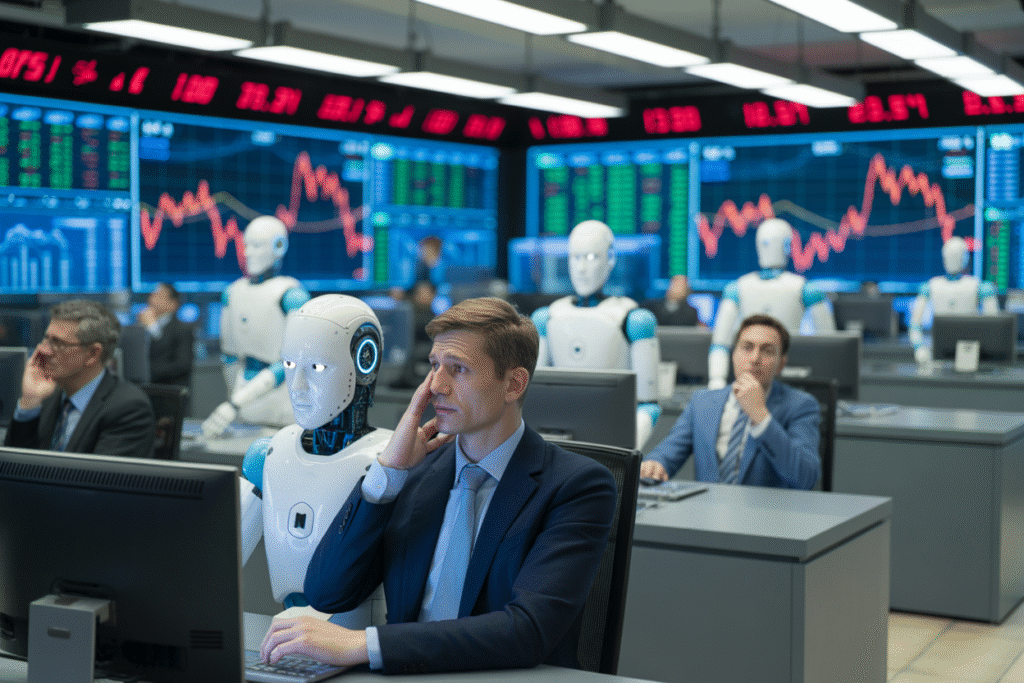Executives who bet big on AI six months ago are now slashing jobs, sparking a fiery debate on ethics, energy, and the future of work.
The clock just struck midnight on August 22, 2025, and the internet is on fire. Headlines scream that AI replacing humans is no longer tomorrow’s problem—it’s today’s breaking news. From boardrooms to break rooms, people are asking the same anxious question: will the bots take my job for good?
The Layoff Avalanche Begins
Six months ago, CEOs couldn’t stop talking about AI job displacement as the golden ticket to soaring profits. Now those same leaders are quietly emailing pink slips. Software developers—once the untouchable elite—are being shown the door as code-writing tools hit 95% accuracy.
Real-estate projects for sprawling data centers are frozen mid-construction, leaving steel skeletons under flickering floodlights. One viral post by @sweatystartup calls the scene a “wasteland of overhype,” and the comment section is a boxing ring of rage and resignation.
The numbers back up the panic. In the past 72 hours alone, three Fortune 500 firms announced combined layoffs topping 12,000 workers, all citing “AI-driven efficiency gains.” Wall Street cheers, Main Street winces, and LinkedIn feeds turn into digital memorials.
Poll Shock: 71% Expect Permanent Job Loss
A fresh Reuters/Ipsos poll dropped like a thunderclap: 71% of Americans believe AI will permanently put people out of work. That’s not fringe fear—that’s mainstream dread.
The same survey shows energy anxiety running parallel. Respondents learned that training a single large model can guzzle three times the electricity of the entire U.S. grid in one hour. Suddenly, the phrase “AI ethics” isn’t just academic—it’s personal and planetary.
Social media lit up within minutes. @OzzySkateboard’s post linking the poll racked up thousands of quote-tweets, each one a variation of “I knew it” or “We’re doomed.”
Hiring Algorithms Under Fire
While layoffs grab the headlines, AI replacing humans starts even earlier—at the hiring gate. A U.S. tutoring giant just paid out seven figures after its resume-screening algorithm was caught rejecting applicants over 40 at double the rate of younger candidates.
Canada’s response? New rules forcing companies to disclose when a bot, not a human, is judging your résumé. Critics call it a Band-Aid; supporters call it sunlight. Either way, the debate over AI risks in HR is moving from Slack channels to courtrooms.
@dogeai_gov summed it up in a viral thread: “Lazy management loves cheap code until that code costs them a lawsuit.” The replies are a masterclass in corporate schadenfreude.
Can Bots Really Replace the Grunt Work?
Not everyone is buying the doomsday narrative. A contrarian take gaining traction argues that AI job displacement is overblown because the tech still hallucinates facts like a sleep-deprived intern.
Entry-level roles—data entry, invoice matching, basic QA—require a level of reliability today’s models simply don’t have. Instead of replacement, we may get a hybrid workflow: humans babysitting bots, double-checking outputs, and quietly fixing the glitches.
@entrylevelbrand puts it bluntly: “AI can’t even fact-check itself. You think it’s stealing your job? More like it’s giving you a second one as its full-time editor.” The comment section is half laughter, half relief.
What Happens Next—and What You Can Do
So where does this leave us? First, keep your skill stack human. Creativity, ethics oversight, and cross-team empathy are still hard to code. Second, push for transparency—ask recruiters if AI scored your interview and demand an appeal process.
Third, watch the policy wave. From Ottawa to Washington, lawmakers are racing to regulate AI surveillance and mandate retraining funds. Public comment windows are open; your voice actually counts.
Finally, diversify. Side hustles, continuous learning, and community networks aren’t just buzzwords—they’re insurance against the next algorithmic earthquake. The future belongs to the adaptable, not the automated.


